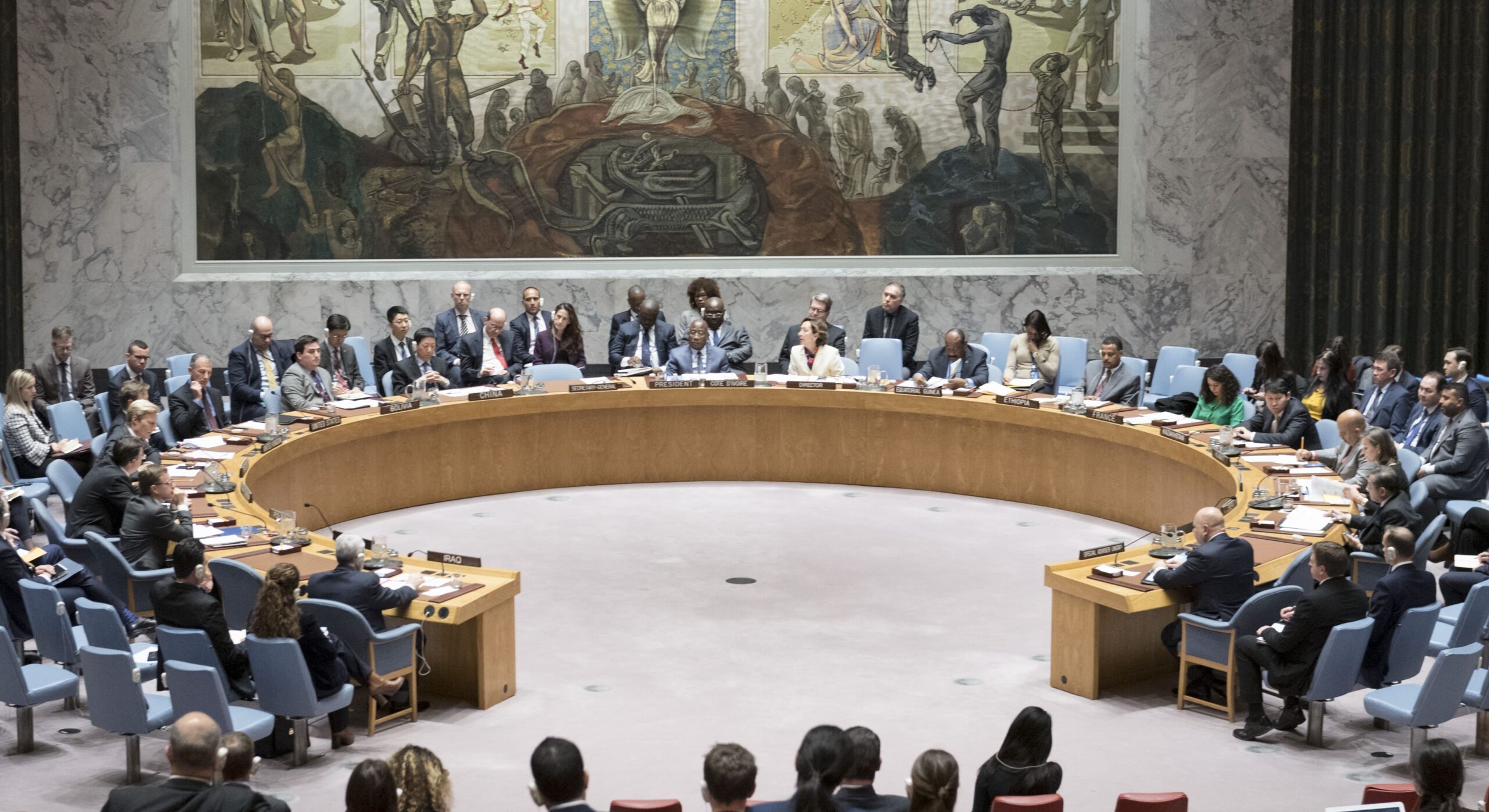Perspective
Solar Geoengineering, Sovereignty, and the Case for Ecological Realism
Beth Chalecki argues that states clinging to an outdated vision of sovereignty could see solar geoengineering as a means to disrupt their rivals. However, she suggests that if they recognise the world’s ecological realities, there may be a collaborative path forward on these contentious technologies.

Photo: Johannes Simon
From an international security standpoint, climate change is the kraken. Chinese expansion, nuclear weapons, Russian invasions, violent extremist organizations – these are threats states already know how to deal with. Climate change, by contrast, affects the long-term (in)stability of the entire global system.
That system rests on sovereign states and their voluntary cooperation with one another. The key elements of sovereignty relative to geopolitics are that nations have a right to determine their own interests, and that each nation’s territory is inviolable by other states. The political principle of reciprocity keeps these elements operative – I don’t interfere in your affairs if you don’t interfere in mine.
As a working concept in modern international relations, however, sovereignty has been eroded in a number of ways – by multinational corporations and global financial flows, by pandemics, by the norms and obligations of international humanitarian law and assumptions of protection for vulnerable populations. Now sovereignty has been de facto destroyed by our growing recognition of the threats posed by global climate change. But states still cling to it when formulating plans, strategies, and conventions because it’s all they know.
The concept of sovereignty has limited our thinking to the point where we consider solar geoengineering to be a rational response to a climate crisis that we are unwilling or unable to limit any other way. The customary international law regime has failed when it comes to climate. States cannot or will not shoulder the cost and work necessary for mitigation, lest they lose comparative advantage relative to another sovereign country, and they are more than happy to let the cost of adaptation be borne by those people unlucky enough to need it. This leaves us with our third option: climate-altering technologies of some kind.
The scientific and ethical implications of solar geoengineering, particularly stratospheric aerosol injection (SAI), have been made elsewhere, but I want to talk about the security implications. I have consulted on this matter for the U.S. Army, the Pentagon’s Office of Net Assessment, U.S. Strategic Command, and NATO, and the realist security paradigm hasn’t changed. States still see security as their primary value, but the sovereignty they rely on for their security is eroding with every microbe, cyberattack, or heat wave. States still think they are secure if they can repel foreign armies. But can they repel a storm surge?
To make matters more opaque, despite the breathtaking planetary scope of solar geoengineering, it is the great power states who will be making the decisions of whether, when, and how to deploy it.
Great powers are the states likeliest to have the scientific prowess to develop and implement solar geoengineering. If we compare it with other game-changing global technologies from the last century such as atomic science, vaccines, and the internet, it is clear that in each case the idea was born in the developed world and implemented for their own security and well-being, then exported to other countries who felt they had to have it in order to keep up. The withholding of any of these technologies can mean a compromised global position for the country that doesn’t have it: lack of nuclear energy means increased reliance on fossil fuels; lack of internet access means being shut out of efficiencies in global information services; lack of vaccines means continued deaths, economic slowdowns, and the rise of new variants.
This scientific prowess means that the lure of the “technological fix” can often be irresistible to policymakers, especially when the other options are expensive (emissions cuts) or painful (adaptation). Due to their hegemonic position in the world, great powers are most apt to think that their own security concerns are worth any planetary risk solar geoengineering might run. Inherent in great power status is a certain arrogance that the destiny of the world, or at least a region of the world, is theirs to control. For all the lip-service we pay to the UN principle of self-determination, smaller states are almost always at the mercy of the decisions great powers make.
The United States is moving forward with consideration of and planning for solar geoengineering technology, so the scientific and ethical arguments against it are not likely to sway policy makers’ decision process. If the United States goes ahead with this, other nations will follow, to the extent of their capabilities. Even leaving aside any secondary economic benefits such as development of new technologies, they cannot afford to let the United States gain operational hegemony over the atmosphere. The state that first deploys solar geoengineering at scale launches the climate arms race.
Could solar geoengineering be used as a weapon? Not in the traditional sense of point-and-shoot, but it really depends on what you mean by “weapon”. War and conflict between states has evolved in the last three-quarters of a century, and as countries get richer and more economically intertwined, outright war doesn’t seem like such a good idea. But this doesn’t mean that great power rivalry has gone away. Now, solar geoengineering or any technology that might change the climate of a rival state, even if slowly, could be used as an offensive destabilization weapon as part of a state’s gray zone strategy. Gray zone conflict lies between war and not-war, and has become more prevalent as the risks and costs of traditional high politics war have made it less attractive. However, once a technology is developed, the logic of sovereignty means that nations will use it to gain an advantage over their rivals.
It takes time for a new security paradigm to evolve, and our current interpretation of sovereign hegemony won’t allow for any other version of international relations or security in the decade or so we have left to bend the greenhouse gas emissions curve downward. States will continue to pursue development and deployment of solar geoengineering through the lens of what Bernard Baruch called “narrow sovereignty”, even though this is exactly what has failed us in the perpetuation of this problem and the construction of any possible solutions. So, what can we do?
I really wish I had the perfect answer but the closest I can come is this: the advancing effects of climate change and the treatment of geoengineering governance point to a new international relations security paradigm called “ecological realism”, in which the maintenance and protection of a stable planetary biosphere is every nation’s primary security objective. This means that states have a security incentive to prioritize climate protection to avoid their own citizens suffering the worst impacts. Other security goals can be pursued in conjunction with environmental protection under ecological realism, but where other goals conflict with ecological stability, the latter takes precedence in decision making.
What could ecological realism look like in practice? Well, since a country’s economy, public health, cultural identity, diplomatic relationships with neighboring states, and national security all rely on a healthy ecosystem, ecological realism shouldn’t be too much of a conceptual leap for most sovereign states in the global system. New rules of engagement for military forces can forbid destruction of environmental resources during conflict. Supposedly-free trade can be jettisoned for preferential rules for those states that achieve their greenhouse gas reduction goals, a kind of Climate Club. A propaganda campaign can help create new norms and laws around use of technologies like solar geoengineering so as to discourage unilateral deployment.
I know what you’re thinking: sure, Beth, sounds great but how do we get there from here? Naysayers in both the geoengineering and international relations fields think this idea is out there like Lagrange 1. But states that reject ecological realism are working against their own climate and ecological stability, and imperiling their own future security. The fact that states are already considering solar geoengineering means that they have no answer – they are implicitly admitting the current norms of global security are bankrupt in the face of the climate crisis. The 2021 National Intelligence Estimate on Climate Change and International Responses states flat out that climate change will increase risks around the world and decarbonization is not moving nearly fast enough to offset these risks.
A unilateral solar geoengineering deployment is provocative in a climate of distrust. Lack of international agreement about climate intervention won’t stop a great power from going ahead if they have the ability and they think it’s in their interest to do so. However, if states attempted solar geoengineering under the ecological realism paradigm, it could alleviate some of the fears of a climate arms race, while enabling states to employ what the Canadians call a “strategy within a strategy” – making sure their security needs are met while strengthening the rules-based international order.
Ecological realism might thread the needle of sovereignty, great power positioning, and a failing global ecosystem by incentivizing its protection. As I see it, we have two choices: we either cling to sovereignty and let the climate go to hell, or we recognize the indivisibility of the ecosystem and put its preservation first for our own security.
The views expressed by Perspective writers and News Reaction contributors are their own and are not necessarily endorsed by SRM360. We aim to present ideas from diverse viewpoints in these pieces to further support informed discussion of SRM (solar geoengineering).



